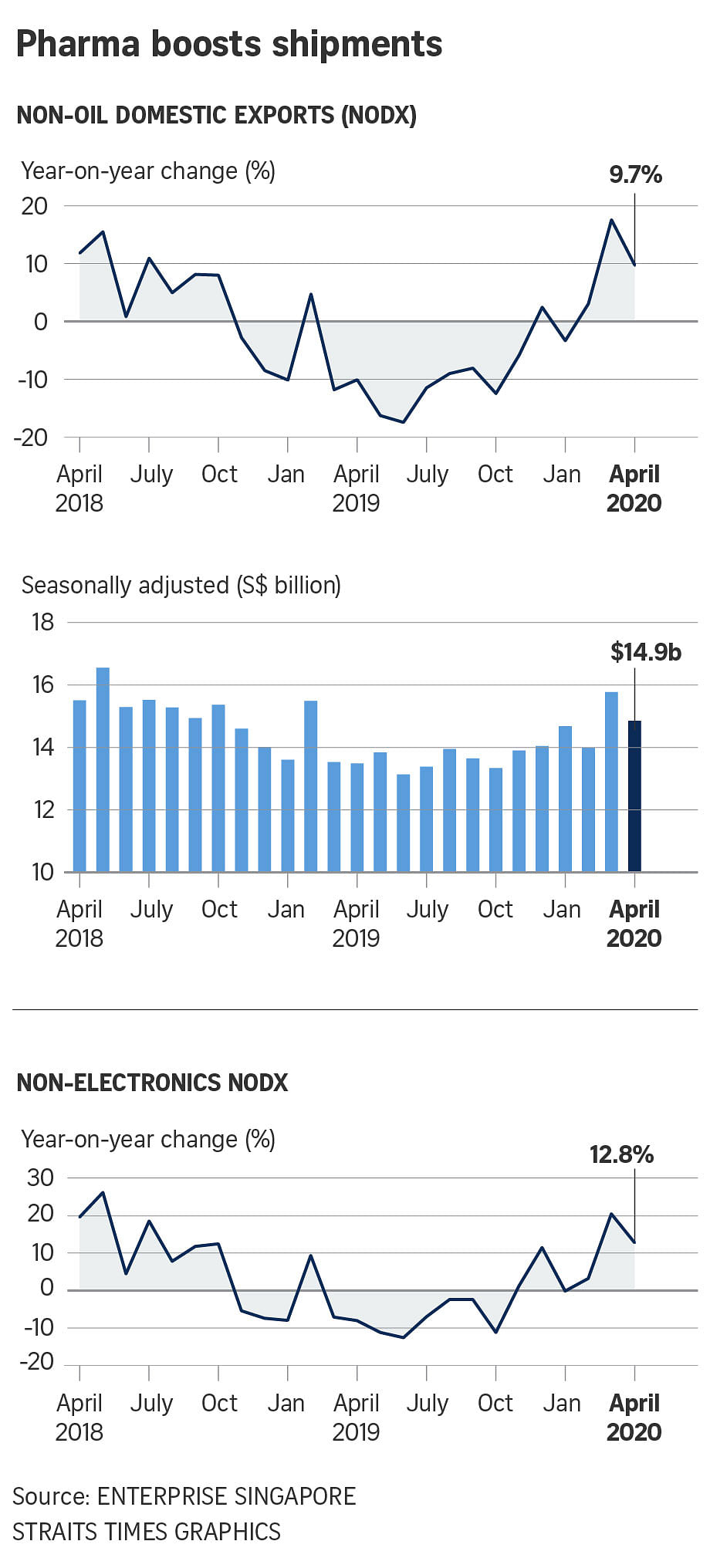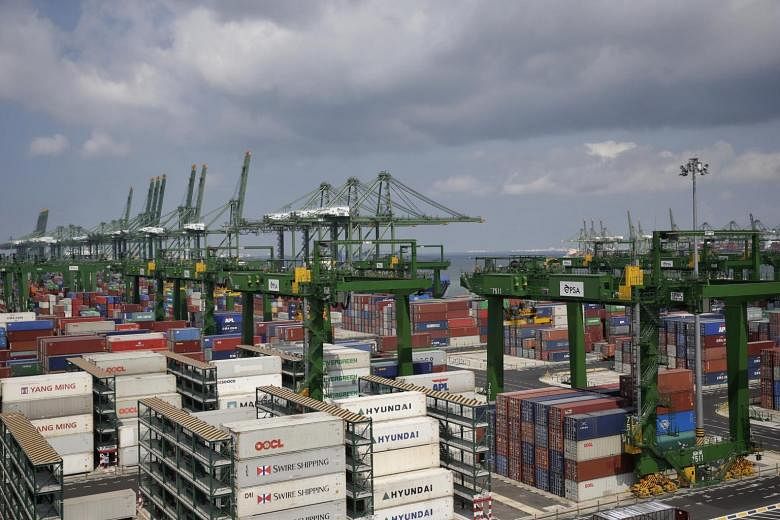SINGAPORE - Singapore's non-oil domestic exports (Nodx) rose in April, due mainly to a jump in pharmaceuticals from a low base, Enterprise Singapore data showed on Monday (May 18).
Nodx increased 9.7 per cent last month from a year earlier, backed by a 12.8 per cent surge in non-electronics exports that included a 174.3 per cent gain in pharmaceuticals, a 66.3 per cent rise in food preparations and a 25 per cent rise in non-monetary gold.
This is the third straight month of year-on-year gain for Nodx, despite a gloomy economic climate amid a global recession caused by the Covid-19 pandemic. It defies a consensus forecast of a 5 per cent Nodx decline in a Bloomberg survey of analysts.
Exports had surged 17.6 per cent in March after a 3.1 per cent rise in February. The three-month moving average now stands at 10.2 per cent. Still, most analysts are not convinced about the sustainability of the upswing and spillover benefits to the manufacturing sector.
"While it may be tempting to conclude that the worst could be over, we need to take the latest set of figures with a pinch of salt," said DBS Bank senior economist Irvin Seah.
While the bulk of the growth in exports came from pharmaceuticals, with medical supplies being in high demand globally to fight the outbreak, a low base for the sector in April 2019 may have exaggerated the increase.
Enterprise Singapore (ESG) noted that pharmaceuticals exports were $0.9 billion in April last year, lower than the 2019 average of $1.4 billion.
Pharmaceuticals Nodx are typically volatile in nature and subject to fluctuations across months, ESG added.
Analysts believe non-monetary gold and food preparations may have also benefited from the pandemic.
Ms Selena Ling, OCBC Bank's head of treasury research and strategy, said the spike in gold exports is likely due to the bouts of risk aversion arising from Covid-19, US-China bilateral tensions and central bankers' caution over the economic outlook. Gold's benchmark price recently hit a seven-year high of US$1,755 per ounce in London.
Food preparation shipments have picked up amid the supply chain disruptions and subsequent restocking worldwide, Ms Ling said. While Singapore imports about 90 per cent of the food it consumes, the local food manufacturing industry exports flavours, sauces, ready meals, noodles, deli meat, sausage, confectionery, chocolates, snacks and beverages.
To measure the impact of Covid-19 on external demand, Nomura International excluded pharmaceuticals and gold exports to show that Nodx in April actually dropped for the first time in three months.
Mr Euben Paracuelles, an economist at Nomura, calculated that Nodx last month - without the contributions from the two sectors - fell 5.6 per cent year on year from a gain of 2.3 per cent in March.
ESG data showed that shipments of electronic goods slipped 0.6 per cent year on year in April, reversing from a 5.8 per cent gain in March.
Contributing the most to the decline in electronic exports in April were personal computers, diodes and transistors, and disk drives, which fell 44.3 per cent, 13.2 per cent and 32.9 per cent respectively.
Growth of petrochemicals exports also worsened, falling 24.9 per cent after a 22.5 per cent decline in March.
On a month-on-month seasonally adjusted basis, overall Nodx fell 5.8 per cent last month, after the previous month's 12.8 per cent expansion. Both electronic and non-electronic domestic exports decreased month on month. Nodx reached $14.9 billion in April 2020, lower than the previous month's $15.8 billion.
The low base effect from pharmaceutical shipments may prove to be a boon for Nodx for most of 2020, said UOB Group economist Barnabas Gan.
Mr Gan said pharmaceutical exports declined for straight six months from June to November 2019, after recording a formidable 28.5 per cent year-on-year expansion in May 2019.
"Should we retain the argument that a low base in the previous year had a hand in supporting pharmaceutical exports, a temporal decline in pharmaceutical exports in May 2020 may be seen, after which low base effects coupled with an increased demand for medical goods during the Covid-19 pandemic may be the linchpin of growth for Singapore's non-electronic Nodx," he said.
Singapore's exports to its top markets grew as a whole last month, though shipments to China, Hong Kong, Malaysia, Indonesia and Thailand declined. The largest contributors to the Nodx growth were the United States (+124 per cent), the European Union (+106.8 per cent) and Japan (+81.1 per cent).
Total trade decreased 12.8 per cent year on year, following the 0.2 per cent decline in March. Total exports declined by 12.7 per cent, while total imports contracted by 13 per cent in April.













